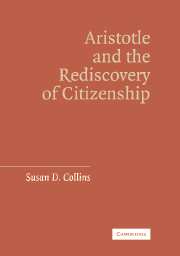Book contents
- Frontmatter
- Contents
- Acknowledgments
- Aristotle and the Rediscovery of Citizenship
- Introduction: The Rediscovery of Citizenship
- 1 Liberal Citizenship and Aristotle's Ethics
- 2 Citizen Virtue and the Longing for the Noble
- 3 Justice as a Virtue
- 4 Prudence, the Good Citizen, and the Good Life
- 5 Citizenship and the Limits of Law
- 6 Political Wit and Enlightenment
- Conclusion: Aristotle and the Rediscovery of Citizenship
- Bibliography
- Index
3 - Justice as a Virtue
Published online by Cambridge University Press: 17 July 2009
- Frontmatter
- Contents
- Acknowledgments
- Aristotle and the Rediscovery of Citizenship
- Introduction: The Rediscovery of Citizenship
- 1 Liberal Citizenship and Aristotle's Ethics
- 2 Citizen Virtue and the Longing for the Noble
- 3 Justice as a Virtue
- 4 Prudence, the Good Citizen, and the Good Life
- 5 Citizenship and the Limits of Law
- 6 Political Wit and Enlightenment
- Conclusion: Aristotle and the Rediscovery of Citizenship
- Bibliography
- Index
Summary
As a principle of the political order, justice is the focus of much scrutiny in contemporary political theory, yet even among neo-Aristotelians, little attention is paid to justice as a characteristic or virtue of the individual. Aristotle, by contrast, begins his inquiry by emphasizing that justice is like the other virtues in constituting a characteristic that disposes us to act well, namely, “to do just things, act justly, and wish just things” (NE 1129a3–11). His first task, then, is to examine justice as a virtue that constitutes our perfection. The immediate complication is that justice has two meanings that are similar but not the same: “the lawbreaker is thought to be unjust,” but so too is “the one who takes more than his share [pleonektēs] and is unfair [lit. “unequal,” anisos]” (NE 1129a32–4). In short, justice may mean either “lawfulness” or “fairness,” alternatives that Aristotle classifies under the respective headings of general and particular justice (NE 1129a34–b1). Accordingly, there exist two different, though related, characteristics in the case of justice. General justice as lawfulness is complete virtue, understood as the sum of all the virtues directed toward the good of another (NE 1129b26–30). Particular justice as fairness is the proper disposition concerning the good things – security, money, and honor – in which all who belong to the political community must share (NE 1130a32–b5).
- Type
- Chapter
- Information
- Aristotle and the Rediscovery of Citizenship , pp. 67 - 90Publisher: Cambridge University PressPrint publication year: 2006



